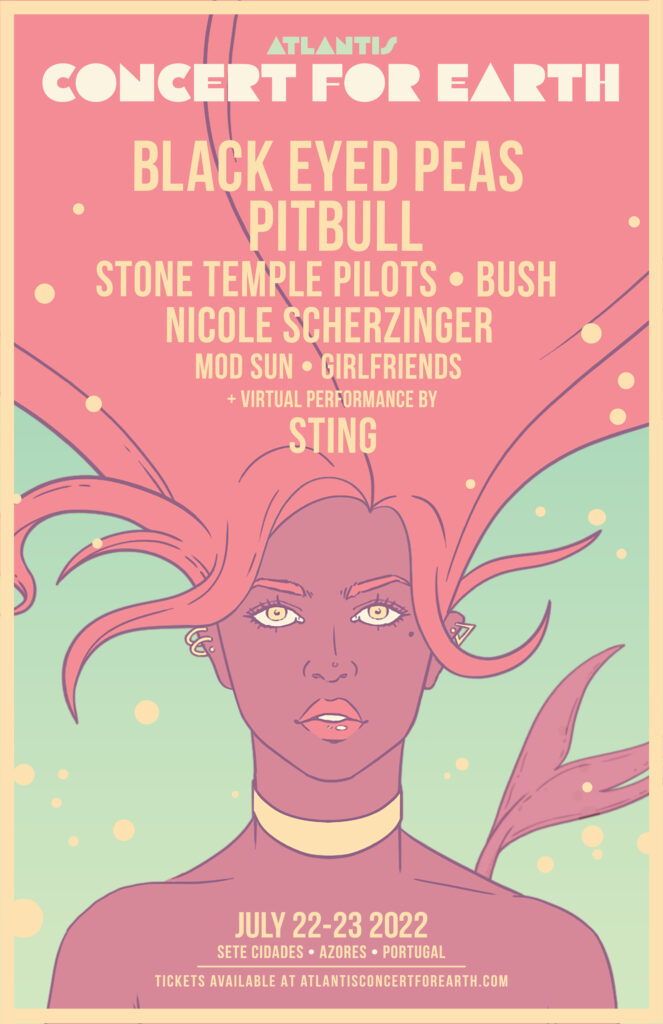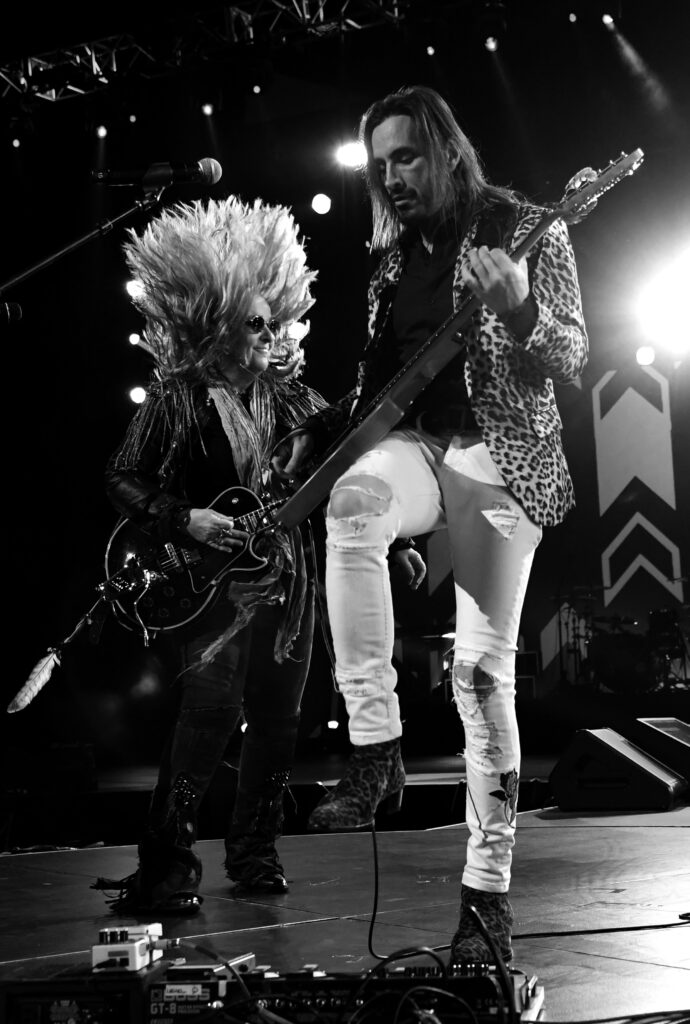The sounds of construction ring out around Nuno Bettencourt. The guitar player, most notably of Extreme and Rihanna fame, is in Sete Cicades, a volcanic crater on an island in his birthplace of Azores, Portugal. Bettencourt is in the final stretch of building Atlantis Concert for Earth, a two-day event focused on conservation, which will take place on July 22ndand 23rd. The nonprofit concert features Black Eyed Peas, Pitbull, Stone Temple Pilots, Bush, Nicole Scherzinger, Mod Sun and Girlfriend, plus a virtual performance by Sting, and will be livestreamed for free on Veeps.
In this stunning natural amphitheater, where there is no event infrastructure of any kind, Bettencourt is not a superstar guitar player with chart-topping hits, whose licks were recently featured on Stranger Things and The Boys, and who shared the GRAMMY stage with Paul McCartney, Kanye West and Rihanna. Rather, Bettencourt is a concert producer, who is also a troubleshooter, question answerer, problem solver, whose nimble fingers are figuratively rolling up the sleeves of his checked shirt so everything that has to be done in order for this inaugural event to go off as smoothly as possible, gets done.
“The echoes in my head, which are still going on today is everybody saying: ‘Don’t do it in the crater, don’t do it in the crater, don’t do it in the crater’,” says the ageless Bettencourt from a makeshift tent that has a decent WiFi signal—one of the many pieces he had to provide. “There is nothing here. We had to build everything from the ground up. Everybody said I was crazy, but once they got here, they said, ‘We get it.’ You have to come here to realize the psychological impact, why this has to be the arena, why it has the voice for this specific concert.”

The idea for Atlantis Concert for Earth first came to Bettencourt some 17 years ago when he was sitting in this very location. It took many conversations with various governments—including Bettencourt communicating in his mother tongue of Portuguese, before the approvals of various officials synced up, and he began on the practical aspects of staging the show.
Says Bettencourt, “If there’s one thing I learned, it is doing something good is not easy. If we just called it ‘Concert for the Azores,’ nobody would have asked any questions or cared about how many cars or how many flights or how many anything. The second I added ‘Earth,’ it’s incredible how people started attacking us. It’s incredible how they don’t come to help.”
Bettencourt did not leap into a concert tagged with conservation without doing extensive research. Atlantis Entertainment, the media and production company that Bettencourt co-founded and is the CEO of, did a 132-page study of the land, which pinpointed Sete Cicades’ environmental issues, among them, erosion and cattle emissions. They worked with the department of agriculture to make sure they wouldn’t destroy any of the natural environs. They are using as many local resources as possible. With the assistance of Atlantis’ co-founder, Steve Schuurman, the aim is to not only be carbon neutral, but carbon negative in their impact. And they’ve enlisted A Greener Festival to keep them in check.
If Bettencourt thought dealing with bureaucracy was the hard part, he was thoroughly unprepared for the struggle he had when reaching out to his musician peers. Says Bettencourt, “The most disappointing and disheartening thing to do was reaching out to artists. I thought we were all going to hold hands and jump in. I thought we were going to have too many artists. The ones we have, we got by the skin of our teeth, and I thank them all the way for doing this.
“There are artists I’ve known for 20 years,” he continues, “people that are my close friends, who after I asked them to do this concert, I haven’t spoken to for two years because they won’t pick up my call anymore or return my emails. Other artists that I’ve toured with, performed with, whom I know, but I may not have their phone number, I can’t get past the gatekeepers. We’re hoping once we get this off the ground, plant that flag, livestream, have the proof of concept and people see it’s not a Fyre Festival, we can continue to do this every year.”

Atlantis Concert for Earth’s goal is not so much fundraising as it is bringing awareness. Unlike other environmentally-focused events, the idea is not to point out what humans are doing wrong and triggering emotions with highly-charged, distressing videos of the environment. Instead, the idea is to put the spotlight on organizations and individuals whose proactive and practical every day actions are making a difference, and how the average person can do the same. To quote Bettencourt from the event’s press release, “It’s time to stop telling everyone how we are all going to die, but instead show them how we’re all going to live.”
The way the program is laid out, the featured organizations, among them, Re:wild, Sea Legacy, Blue Azores, The Ocean Cleanup, Innerspace, Juccce, The White Feather Foundation, Grounded, Earth Uprising, and Earth Percent, will deliver their messages of positivity in between musical performances. Bettencourt’s aim is to stay away from the “TED Talk” style of delivery, and instead bring engaging and relatable content that the average concert-goer or viewer can understand and apply.
“We’re sneaking what we’re doing, which is solutions to the six pillars of conservation we’re focusing on, in between each artist,” says Bettencourt. “The music is kind of like the sugar for the medicine, if you will.”
Tickets to Atlantis Concert for Earth are set at the low price point of €25 for a two-day pass. Bettencourt’s expectation is that 99% of the attendees will be local and that amount is in-keeping with their income level. The crater can hold up to 30,000 people, but it is capped at 10,000 in consideration of the environment. Any profits will be divided among the participating organizations. Additionally, there will be a donate option on the Veeps livestream. Again, the intention is not fundraising—in fact, the organizations have indicated to Bettencourt that is not what they need at the moment, but the exposure and getting the message to people who otherwise would never hear of them.
The predicted audience, particularly on the livestream, would be the Gen Xers who are parents, and the Bettencourt-specific audience is arguably among the ones who may not otherwise hear, or listen to, conservation talk. Yet the absence of Bettencourt himself from the lineup is noticeable, particularly as he has two solo albums coming, and according to him, Extreme has a new album in the works, their first since 2008.
“I don’t want anyone to ever have the perception that I am using this platform for any other reasons than what is it for,” Bettencourt explains. “Maybe years down the line, I jump in on a jam or something. But it’s important that the message is: This is not a platform to further my career or even any band’s career. This is us furthering the careers of these important organizations, changing the negativity to positivity, changing it to hope, inspiration and solution-driven.”

Leave a comment